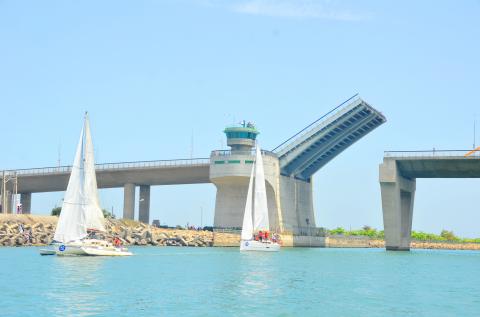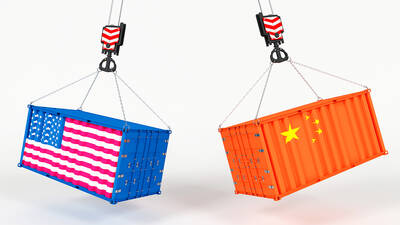Chinese practice
船到橋頭自然直
The boat will sail straight when it reaches the bridge.

Photo: Yeh Yung-chien, Liberty Times
照片:自由時報記者葉永騫攝
成語「船到橋頭自然直」,字面上的意義是「當船航行到了橋頭,它自然就會打直了」,這句話是用來安慰說,在不利情況下的關鍵時刻,總有解決方式會自己出現。船到橋頭自然直有時也作「船到橋門自會直」。
「船到橋頭自然直」這個成語,是出於中國導演洪深在一九三○年至一九三二年間所作《農村三部曲》劇作的其中一部,名為《香稻米》。
在《香稻米》第二幕中,劇中角色黃二官說:「不要這樣想,『船到橋門自然直』,我們慢慢的總有法子好想。」
「船到橋頭自然直」也常見於此對句:「車到山前必有路,船到橋頭自然直」。這句話字面的意義是:「當車開到了山前,我們就會找到通過的路;當船航行到了橋頭,船身自然就會打直航行。」
在英文中類似的成語及說法為:「Let’s (we’ll) cross that bridge when we come to it」(讓我們遇到橋後再過橋)以及「Let’s worry about it when it happens」(等到事情發生我們再來擔心吧)。此二句的意思都是現在不需擔心,只要等問題發生後(如果真的會發生)再處理它就行了。
英文中兩個更進一步的說法是「Everything will be all right in the end」(一切最後都會沒問題的)以及「It will be all right on the night」(到了〔表演〕當晚準會令人滿意),這兩句都和上段兩句類似,但是這兩句都更強調不利的情況,也更有到最後一切都會順利完成的勸慰之意。
(台北時報編譯林俐凱譯)
英文練習
Let’s cross that bridge when we come to it.
The Chinese proverb 船到橋頭自然直 literally means “The boat will sail straight when it reaches the bridge” and is used to reassure that a way out always presents itself at the critical juncture of an unfavorable situation. 船到橋頭自然直 is also sometimes written as 船到橋門自會直.
The proverb 船到橋頭自然直 appeared in Fragrant Rice, one of three plays collectively known as Trilogy of the Countryside, written by Chinese writer and film director Hong Shen between 1930 and 1932.
In Act 2 of the play, Huang, the offspring of a senior official, says the line: “Don’t think such thoughts, ‘the boat will sail straight when it reaches the bridge;’ we’ll eventually hit upon a solution.”
船到橋頭自然直 also appears after the common saying 車到山前必有路 to form the couplet: 車到山前必有路,船到橋頭自然直. The phrase literally means: “When the cart reaches the mountain, we’ll find a way through; when the boat reaches the bridge it will sail straight.”
Similar proverbs and sayings to 船到橋頭自然直 in English are: “Let’s (we’ll) cross that bridge when we come to it” and “Let’s worry about it when it happens,” which both mean that there is no need to worry now; one should deal with the problem when — and if — it arises.
Two further sayings in English, “Everything will be all right in the end” and “It will be all right on the night,” are similar to the above two, but in both there is a stronger certainty that the unfavorable situation will take place and a stronger connotation of reassurance that all will turn out well in the end.
(Edward Jones, Taipei Times)

Returning to the White House with unprecedented economic weaponry, US President Donald Trump has launched a comprehensive tariff offensive that has sent shockwaves through international markets. On April 2, Trump announced his “reciprocal tariff” strategy, aimed at punishing trading partners who sell more to the US than they buy in return. Central to his policy is the disputed view that such trade deficits harm the US economy. While Trump later suspended most of the tariffs to allow time for negotiations, some still went into effect, and the others remain a looming economic threat. Tariffs, essentially taxes imposed on imported goods, raise

★ Bilingual Story is a fictionalized account. 雙語故事部分內容純屬虛構。 Wu Gang bent low, his axe heavy in his hands. Sweat rolled down his back. He struck the osmanthus tree. The wound closed again. He paused to breathe. He admired the branches, glowing against black silence of space. He smelled the blossoms, sweet but fleeting. Long ago, he drank deep of wine. He chased fast pleasures. He sought the potion of immortality. Not to escape death, but to merge with the Dao. Yet he hurried. He demanded the quick path. The Jade Emperor saw his heart. Desire without patience. So

A: US singer Taylor Swift finally released her 12th album, titled “The Life of a Showgirl,” on Oct. 3. B: The pop diva’s dominating the Billboard charts once again. A: Earlier this year, she also successfully bought back the master recordings to her first six albums. B: And the good news keeps coming, as she and NFL superstar Travis Kelce announced their engagement not long ago. A: Wow! It must be her lucky year. A: 美國歌手泰勒絲10月3日終於推出第12張專輯︰《The Life of a Showgirl》。 B: 流行天后又再次稱霸《告示牌》排行榜。 A: 今年稍早時,她還成功買回了她自己前6張專輯的錄音母帶。 B: 而喜事連連,她和美式足球巨星凱爾西近日宣布他們訂婚了。 A: 哇今年真是她的幸運年! (By Eddy Chang, Taipei Times/台北時報張迪)

A: While Taylor Swift’s new album conquers the Billboard charts, Billboard Live Taipei is set to open next month. B: Isn’t that a Japanese “live house” of the same name with the magazine? A: Yup, and the live music club’s first Taiwanese branch can accommodate 300 guests. B: Who will be performing at the club’s opening show? A: Japanese singer Mika Nakashima will play four gigs over two nights. Wanna go to the club and watch her perform up-close? A: 天后泰勒絲的新專輯再度征服《告示牌》排行榜,告示牌音樂台北則預計將在下月開幕。 B: 那不是跟《告示牌》同名的日本現場音樂餐廳嗎? A: 對,這家連鎖餐廳的台灣首店約可容納300名觀眾! B: 開幕秀的表演者是誰? A: 是日本歌手中島美嘉,想近距離看她現場演出嗎? (By Eddy Chang,